Garden Maintenance in Mottingham
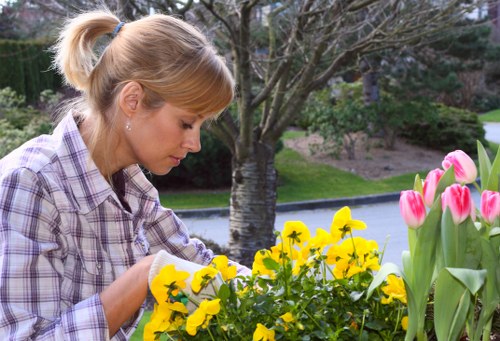
Introduction to Garden Maintenance
Maintaining a beautiful garden in Mottingham requires a blend of passion, knowledge, and regular care. Whether you're a seasoned gardener or a novice, understanding the essentials of garden maintenance can transform your outdoor space into a lush, vibrant oasis.
Garden maintenance encompasses a variety of tasks, from pruning and weeding to lawn care and pest management. Each activity plays a crucial role in ensuring that your garden remains healthy and aesthetically pleasing throughout the year.
In Mottingham, the unique climate and soil conditions present both challenges and opportunities for gardeners. Adapting to these local factors is key to successful garden upkeep.
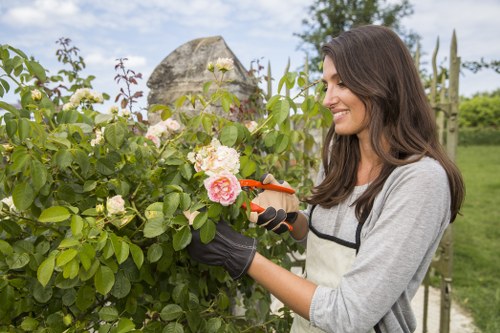
Seasonal Garden Maintenance Tasks
Spring Maintenance
Spring is a critical time for garden maintenance in Mottingham. As the weather warms, it's essential to prepare your garden for the growing season ahead.
Tasks include:
- Pruning dead branches from trees and shrubs
- Weeding and clearing garden beds
- Applying fertilizers to promote healthy growth
Addressing these tasks early can prevent common issues such as pest infestations and plant diseases, setting a strong foundation for the months to come.
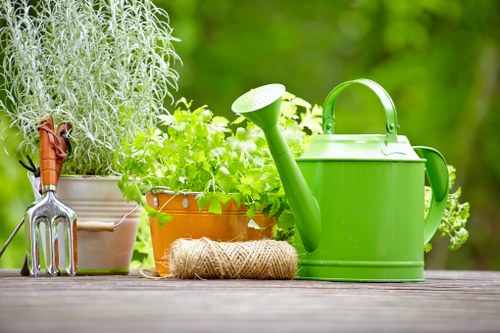
Summer Garden Care
Maintaining Healthy Plants
Summer in Mottingham brings longer days and warmer temperatures, which means your garden requires consistent attention to thrive.
Key maintenance activities include:
- Regular watering, especially during dry spells
- Mulching to retain soil moisture and suppress weeds
- Monitoring for pests and treating infestations promptly
Implementing these practices ensures that your plants remain robust and your garden stays vibrant throughout the summer months.
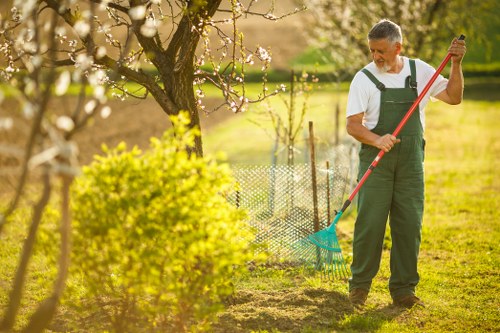
Autumn Garden Preparation
Preparing for the Cooler Months
As summer fades, autumn is the perfect time to prepare your garden for the colder season. Proper autumn maintenance can protect your garden from harsh winter conditions.
Essential tasks include:
- Clearing fallen leaves and debris
- Pruning perennials and removing spent flowers
- Applying compost or organic matter to enrich the soil
These steps help maintain soil health and prepare your garden for a strong start in the spring.
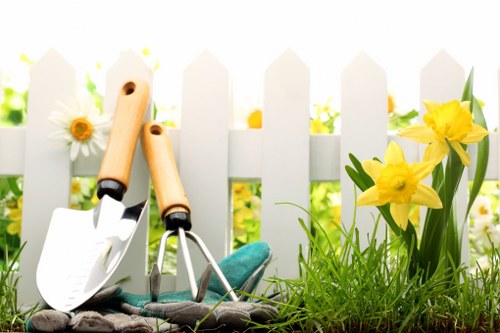
Winter Garden Care
Protecting Your Garden in Winter
Winter in Mottingham can be harsh, but with the right maintenance, your garden can emerge unscathed and ready to flourish in the spring.
Winter maintenance tasks include:
- Protecting delicate plants with mulch or covers
- Pruning trees and shrubs while they are dormant
- Maintaining garden tools and equipment for the coming year
Ensuring your garden is properly cared for during winter helps promote healthy growth and resilience against the elements.
Professional Garden Maintenance Services
While DIY garden maintenance is rewarding, professional services in Mottingham can offer expertise and efficiency, especially for larger gardens or complex landscaping projects.
Benefits of Hiring Professionals
- Expert knowledge of local plant species and soil conditions
- Access to specialized equipment and tools
- Time-saving solutions for busy homeowners
Professional garden maintenance ensures that your garden receives comprehensive care tailored to its specific needs, enhancing both its beauty and longevity.
Choosing the Right Garden Maintenance Company
Selecting a reputable garden maintenance company in Mottingham is crucial for achieving the best results. Here are some factors to consider:
Experience and Expertise
Look for companies with a proven track record and knowledgeable staff who understand the intricacies of garden care in your area.
Services Offered
Ensure the company provides the specific services you require, whether it's regular lawn mowing, pruning, or comprehensive garden management.
- Check for a range of services
- Assess their ability to handle both small and large gardens
- Inquire about personalized maintenance plans
DIY vs. Professional Maintenance
Deciding between DIY garden maintenance and hiring professionals depends on various factors, including time, expertise, and the scale of your garden.
Advantages of DIY Maintenance
- Cost savings
- Personal satisfaction
- Flexibility in scheduling tasks
However, without the necessary knowledge and tools, DIY maintenance can sometimes lead to suboptimal results or even damage to your garden.
When to Hire Professionals
Consider hiring professionals when:
- Your garden requires specialized care
- You lack the time or resources for regular maintenance
- You want to implement complex landscaping projects
Essential Tools for Garden Maintenance
Having the right tools is fundamental to effective garden maintenance. Whether you choose to maintain your garden yourself or hire professionals, understanding the essential tools can enhance the quality of care.
- Pruning shears for trimming plants
- Lawnmowers for maintaining grass
- Weeders and rakes for clearing debris
Investing in high-quality tools ensures durability and efficiency, making garden maintenance tasks easier and more effective.
Organic Garden Maintenance Practices
Embracing organic garden maintenance practices not only benefits your garden but also contributes to environmental sustainability in Mottingham.
Benefits of Organic Practices
- Promotes healthy soil and plant growth
- Reduces the use of harmful chemicals
- Encourages biodiversity and beneficial insects
Implementing organic methods such as composting, natural pest control, and using organic fertilizers can lead to a thriving, eco-friendly garden.
Common Garden Problems in Mottingham
Gardeners in Mottingham often face specific challenges due to the local climate and soil conditions. Being aware of these common problems allows for proactive maintenance and effective solutions.
Pest Management
Pests like slugs, snails, and aphids can wreak havoc on your garden. Regular monitoring and employing natural pest control methods can keep these unwanted visitors at bay.
Disease Prevention
Plant diseases such as mildew and rust can spread quickly if not addressed promptly. Ensuring good air circulation and proper plant spacing helps prevent these issues.
Creating a Sustainable Garden
Sustainability in garden maintenance is increasingly important. Incorporating sustainable practices can reduce your environmental footprint and create a resilient garden.
- Using rainwater harvesting systems for irrigation
- Planting native species that require less water
- Composting organic waste to enrich the soil
These strategies not only benefit the environment but also enhance the overall health and beauty of your garden.
Enhancing Garden Aesthetics
Aesthetic appeal is a significant aspect of garden maintenance. Thoughtful design and regular upkeep can create a visually stunning outdoor space.
Plant Selection
Choosing the right plants that complement each other in color, texture, and height can transform your garden's appearance. Consider seasonal blooms to ensure year-round beauty.
Hardscaping Elements
Incorporating features like pathways, patios, and garden lighting can add structure and charm to your garden. These elements not only enhance aesthetics but also improve functionality.
Lawn Care Tips
A well-maintained lawn is the centerpiece of any garden. Proper lawn care involves regular mowing, watering, and fertilizing to keep your grass lush and healthy.
- Mow at the correct height to promote strong root growth
- Water early in the morning to reduce evaporation
- Apply fertilizer based on soil needs
Implementing these tips ensures a vibrant and resilient lawn that enhances the overall appeal of your garden.
Irrigation and Water Management
Effective water management is crucial for thriving gardens in Mottingham. Proper irrigation techniques ensure that plants receive adequate moisture without wastage.
Types of Irrigation Systems
- Drip irrigation for targeted watering
- Sprinkler systems for broader coverage
- Rainwater harvesting systems to utilize natural resources
Choosing the right irrigation system based on your garden's needs can optimize water usage and promote healthy plant growth.
Mulching for Garden Health
Mulching is a beneficial practice that involves covering the soil with materials like bark, straw, or compost. It helps retain moisture, suppress weeds, and regulate soil temperature.
Benefits of Mulching
- Reduces water evaporation
- Prevents weed growth
- Adds organic matter to the soil
Incorporating mulch into your garden maintenance routine enhances soil health and supports sustainable gardening practices.
Pruning and Trimming Techniques
Regular pruning and trimming are essential for maintaining plant health and encouraging growth. Proper techniques ensure that plants remain attractive and free from diseases.
When to Prune
Different plants require pruning at various times of the year. Understanding the specific needs of each plant species in your garden ensures effective maintenance.
- Prune flowering shrubs after they bloom
- Trim trees during their dormant season
- Regularly deadhead spent flowers
Implementing appropriate pruning schedules promotes robust plant development and enhances the overall structure of your garden.
Soil Health and Fertilization
Healthy soil is the foundation of a thriving garden. Ensuring optimal soil conditions supports robust plant growth and resilience against pests and diseases.
Testing and Amending Soil
Regular soil testing helps determine nutrient levels and pH balance. Based on the results, appropriate amendments like compost, lime, or fertilizers can be added to enhance soil quality.
Organic vs. Synthetic Fertilizers
Choosing between organic and synthetic fertilizers depends on your gardening philosophy and specific plant needs. Organic options promote sustainable soil health, while synthetic fertilizers offer targeted nutrient delivery.
Pest and Disease Control
Effective pest and disease control is vital for maintaining a healthy garden. Implementing integrated pest management strategies minimizes the impact of unwanted visitors and diseases.
- Monitor plants regularly for signs of pests
- Use natural predators like ladybugs for pest control
- Apply organic treatments to combat widespread infestations
Proactive measures and timely interventions help preserve the integrity and beauty of your garden.
Garden Lighting and Décor
Proper lighting and thoughtfully chosen décor elements can enhance the functionality and beauty of your garden, extending its usability into the evening hours.
Types of Garden Lighting
- Pathway lights for safe navigation
- Spotlights to highlight focal points
- Ambient lighting for creating a cozy atmosphere
Incorporating various lighting options adds depth and character to your garden, making it a welcoming space for relaxation and gatherings.
Decorative Features
Elements like garden sculptures, water features, and seating areas contribute to the overall charm and functionality of your outdoor space.
Creating a Wildlife-Friendly Garden
Encouraging wildlife in your garden fosters biodiversity and creates a harmonious ecosystem. Simple practices can attract beneficial insects, birds, and other creatures.
- Plant native species that support local wildlife
- Provide water sources like bird baths
- Install birdhouses and insect hotels
A wildlife-friendly garden not only enhances natural beauty but also supports environmental sustainability.
Hardscaping and Garden Structures
Incorporating hardscaping elements like patios, fences, and pergolas adds structure and functionality to your garden. These features can define spaces and provide areas for relaxation.
Choosing the Right Materials
- Stone and brick for a classic look
- Wood for a natural, rustic feel
- Metal and glass for modern designs
Selecting appropriate materials ensures that your garden structures complement the overall design and withstand local weather conditions.
Maintenance of Hardscaping Elements
Regular upkeep of hardscaping features, such as cleaning surfaces and repairing any wear and tear, preserves their appearance and functionality.
Vegetable and Herb Gardening
Growing your own vegetables and herbs can be a rewarding aspect of garden maintenance. It provides fresh produce and a sense of accomplishment.
Planning Your Vegetable Garden
- Choose suitable locations with ample sunlight
- Prepare the soil with necessary nutrients
- Select vegetables and herbs that thrive in Mottingham's climate
Proper planning and care ensure a productive and bountiful harvest.
Organic Gardening Practices
Adopting organic gardening methods, such as using compost and natural pest repellents, promotes healthy plant growth and reduces environmental impact.
Garden Safety Tips
Ensuring safety in your garden is paramount, especially when using tools and handling plants that may pose risks.
Safe Tool Usage
- Always wear protective gear when using garden tools
- Maintain tools regularly to ensure they are in good condition
- Store tools safely away from children and pets
Handling Plants
Some plants may cause allergic reactions or skin irritation. Knowing which plants to handle with care can prevent unwanted accidents.
Maximizing Small Garden Spaces
Even with limited space, effective garden maintenance can create a lush and functional environment. Utilizing vertical gardening and smart storage solutions can enhance small gardens.
- Incorporate vertical planters to save space
- Use multi-purpose tools and storage systems
- Choose compact plant varieties that suit small areas
With creativity and proper maintenance, small gardens can be just as beautiful and productive as larger ones.
Edible Landscaping
Combining aesthetic appeal with functionality, edible landscaping integrates fruit trees, vegetables, and herbs into your garden's design.
Benefits of Edible Landscaping
- Provides fresh produce
- Enhances garden diversity
- Supports sustainable living practices
Edible landscaping not only beautifies your garden but also offers practical benefits for daily living.
Designing an Edible Landscape
Strategically placing edible plants alongside ornamental ones creates a harmonious balance between beauty and utility.
Composting and Soil Enrichment
Composting is a sustainable practice that recycles organic waste into nutrient-rich soil amendments, enhancing garden soil health.
Setting Up a Compost System
- Choose a suitable location for your compost bin
- Balance green and brown materials for effective decomposition
- Maintain proper moisture and aeration levels
Regular composting reduces waste and provides valuable nutrients for your garden, promoting robust plant growth.
Using Compost in Your Garden
Incorporating compost into garden beds improves soil structure, fertility, and moisture retention, leading to healthier plants and a more vibrant garden.
Advanced Garden Maintenance Techniques
For those looking to take their garden maintenance to the next level, advanced techniques can significantly enhance garden health and aesthetics.
Pruning for Shape and Health
Advanced pruning techniques, such as crown thinning and heading cuts, promote better air circulation and encourage desired growth patterns.
- Thinning to remove overcrowded branches
- Heading to stimulate lateral growth
- Cleaning up to remove diseased or damaged wood
Soil Testing and Amendments
Comprehensive soil testing provides in-depth insights into nutrient levels and pH balance, allowing for precise soil amendments tailored to specific plant needs.
Conclusion
Effective garden maintenance in Mottingham requires a combination of regular care, knowledge of local conditions, and the right tools and techniques. Whether you choose to maintain your garden yourself or enlist the help of professionals, prioritizing garden upkeep ensures a thriving, beautiful outdoor space.
Don’t wait to enhance your garden’s beauty and health. Contact us today to schedule your garden maintenance service and enjoy a stunning garden all year round!

